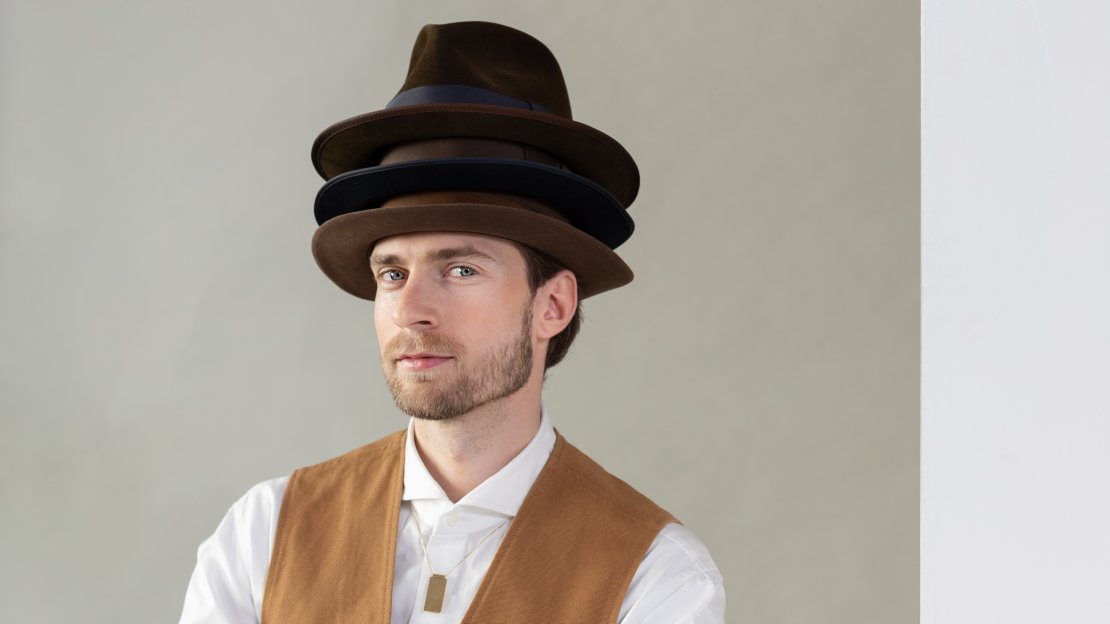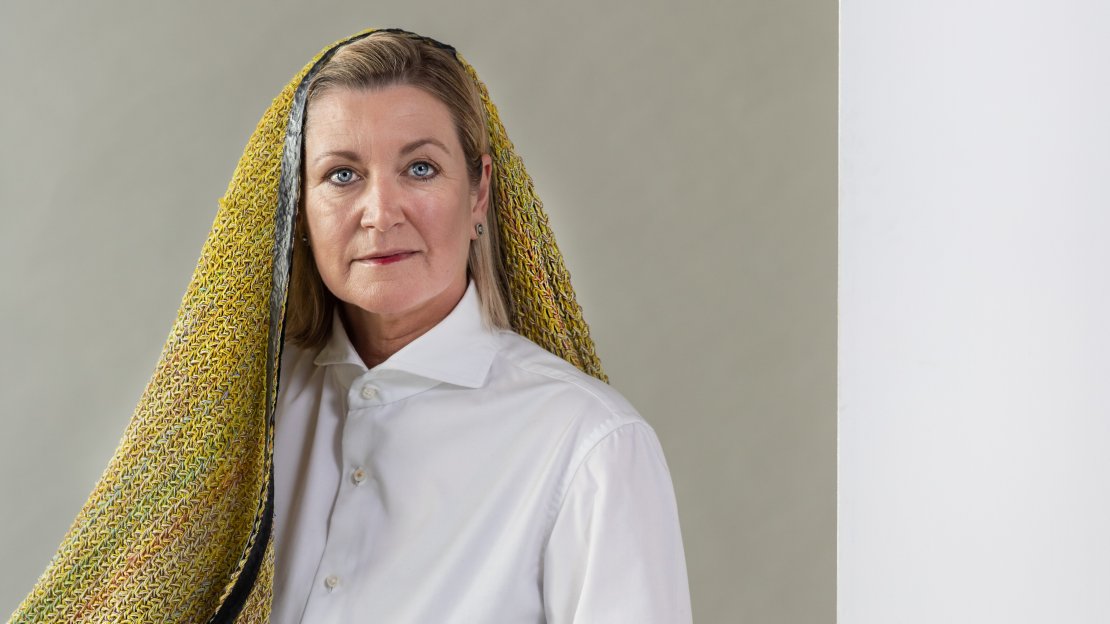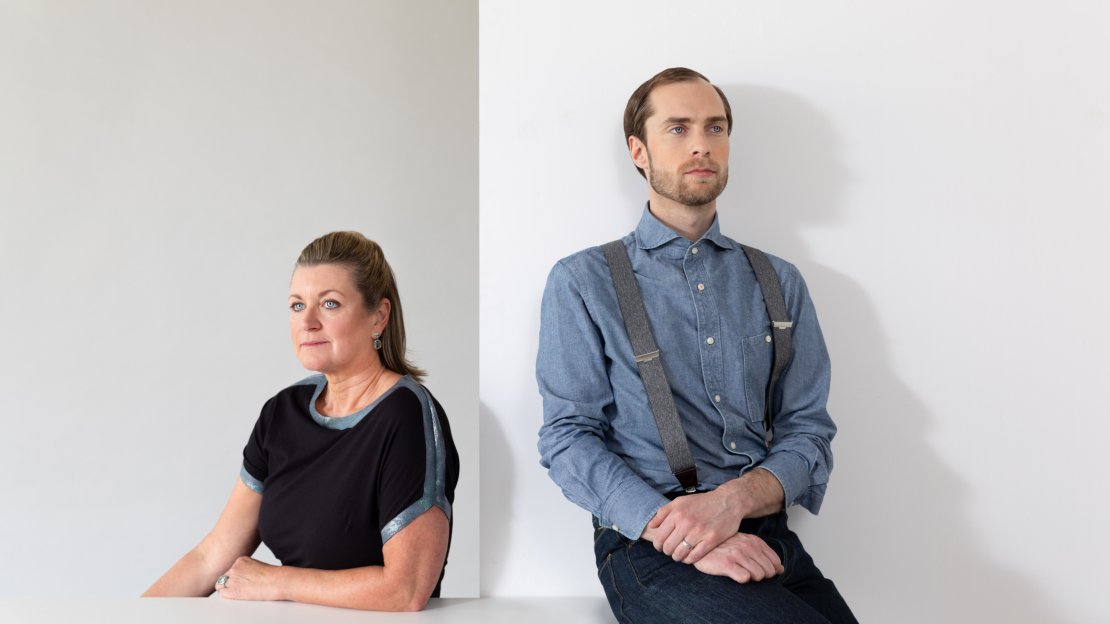What does ‘Shaping 2030’ mean for staff at the University of Twente? In a series of double interviews, two professionals address this topic in dialogue. Where does their work overlap? How do they differentiate themselves? And what can they learn from each other? Two experts on the relevance of their profession in the world – now and in the future. Under the motto ‘Courage over Comfort’, a distinctively modern photo-shoot accompanies each article: in collaboration with cutting-edge fashion designers who have made items incorporating sustainable or technological elements, as befits developments in today’s world. The interviewees have allowed themselves to undergo an exciting light make-over: out of their comfort zone! Today episode 1: Ellen Giebels and Tom Kamperman.
LET'S TALK ABOUT U AND ME!
Tom: ‘Hi Ellen, nice to meet you! Let’s get right down to business: has a professor like you always been interested in academic research?’
Ellen: ‘Well, to be honest, in the beginning I thought the subject of psychology was pretty boring. Maybe because it mostly involved sitting in huge lecture halls – I didn’t really find it that exciting. It was only in my third year that I had a professor who really sparked my interest. That was Evert van de Vliert, a researcher specialising in the field of conflict dynamics. Why do things get derailed so often? And how can you make the resolution process more effective? Later he became my PhD supervisor. Evert totally inspired me with his enthusiasm – at the second lecture, he jumped on the table! He asked fascinating questions and challenged his students to think for themselves. This is fun, I thought. From that time, I started to work a lot harder.’
Tom: ‘And that was the beginning of your academic career?’
Ellen: ‘Not right away. After I graduated, I worked in the business world, but I never really felt at home there. I missed the depth of conceptual thinking. Then Van de Vliert was looking for a PhD student and offered me a place on a great project. It was a project he was leading in collaboration with the social psychologist Carsten de Dreu, who received the Spinoza Prize in 2018 for his work. It all just fell into my lap! My doctoral research focussed on commercial mediation. I conducted experiments with commerce students using role-playing, which was a lot of fun. But now you tell me, how did you get involved in academic research?’
Tom: ‘I didn’t know exactly what I wanted at first either. I even wanted a career as a musician for a while. As things turned out, that has remained a hobby, but otherwise I never had the idea of joining a certain profession. That’s why in secondary school, I choose a combination of subjects that interested me: scientific subjects, including biology. I came to Twente to do my university degree, got my PhD here, and then also did a research post-doc here. Afterwards, I thought, I’ve been here now for thirteen years, maybe I ought to widen my horizons.’

Injectable plaster
Ellen: ‘And those “wider horizons” took you to Boston?’
Tom: ‘Yes, I applied for a Rubicon Grant to go to Harvard. A grant like that gives you the chance to work at a really excellent laboratory. I moved to Boston last January, but then the corona crisis hit and all the labs closed. I’m now working temporarily from the Netherlands due to the lockdown. Of course, I hope to go back as soon as possible.’
Ellen: ‘Just what kind of work are you doing in the US?’
Tom: ‘I’m working on a project that combines human cells with hydrogel, a gel that contains water – like gelatine, for example. Hydrogel is a kind of injectable plaster; it stimulates body tissue. It has all sorts of things in it: growth factors, proteins, and so on. It’s intended for cell-based therapies. Imagine that you have a large wound; in such cases, a combination of cells and biomaterials can offer great possibilities for healing. Right now, I’m working on new techniques to make the gels as small as possible.’
Ellen: ‘And how small should I imagine this?’
Tom: ‘Well, even as small as a single cell. In that way, we can reconstruct tissue at the level of individual cells using 3D print technology. We dissect the tissue and use the cells as building blocks. But a human body cell is fragile, and if you inject it or print it, it can easily get damaged or die. The gel works as a protective cushion: it protects and reinforces cells during printing.’
Ellen: ‘That sounds like a real innovation! Are you already working with patients?’
Tom: ‘No, not yet. We are doing animal trials, in vitro cultures and “organ on chip”, which means making cells and replicating organs outside the body with the aid of stem cells or a chip. This is a way to test the effects of medical procedures and medications on an organ, or directly on a tumour, without subjecting the patient to anything. In the coming years, I expect a lot of innovations in this area. Personalised medicine, for example, where you use stem cells for a specific patient, which allows you, for example, to test medications on these cells outside the body. In the future, we may print tumours or eventually even organs.’

Entrepreneurship
Ellen: ‘Along with your research work you’re also an entrepreneur, aren’t you?’
Tom: ‘That’s right, I’m the co-founder of IamFluidics BV, a University of Twente spin-off. Microgel manufacturing techniques are also of interest to commercial enterprises. There are microparticles in clothing, shampoo – you name it. Only in those cases you aren’t working with human cells. Consider, for example, medicines; the effective agent could be encapsulated in hydrogel, which means you can control the release with more precision. You could inject a drug just once, which then takes effect over a period of several weeks; or for cosmetics, you could replace microplastics with biodegradable hydrogel, which is more environmentally friendly.’
Ellen: ‘Interesting substance. But it seems to me that the combination of working at a university and managing a company is not always easy.’
Tom: ‘They are indeed two completely different worlds, but they actually stand to gain a lot from each other. In research, you are less constrained by time and money. You get time to explore something to the deepest level. But as entrepreneur, you have to achieve results quickly, otherwise your start-up won’t survive. But these two extremes also complement each other quite well – and you get cross-fertilisation. I should say that it is not my ambition to become a professor. I want to remain a researcher and not have to focus too much on teaching.'
Ellen: ‘But the primary task of a university remains knowledge transfer. After your post-doc, you will have to combine your research with teaching.’
Tom: ‘Hahaha, that’s right. But if I have a choice, I would rather focus on research and entrepreneurship for now. Anyway, don’t you also have experience outside the academy?’
Ellen: ‘I certainly do! Towards the end of my doctoral research, I was approached by the Police Academy. They wanted to start a course for police mediators. I started researching crisis mediation: what is the smart thing to do in such situations, and what is counterproductive. Very little was known about such techniques at that point. I was given access to all kinds of confidential recordings – very unusual. Mediators are not always aware of the strategies that they use to influence other people. Should you go for emotions, or is it better to use rational arguments? If you know, then you can consciously change your strategy depending on who is sitting across the table from you. In that project, I developed a framework that we still use to advise police officers today.’
Tom: ‘Have you always kept doing things outside the university?’
Ellen: ‘Yes, work that is practically oriented is like a golden thread running through my academic career. I still teach at the Police Academy. And as of 1 October, I will be joining the board of the Groningen Institute for Mining Damage, which is in charge of settlements for earthquake damage claims. An enormous challenge!’

Pointless experiments
Ellen: ‘I kind of envy you when I hear you talking. It’s really wonderful to be able to concentrate completely on research.’
Tom: ‘What is it like for you, then?'
Ellen: ‘My time for research is quite limited. I became a professor ten years ago. I set up a department and was given managerial duties. I’m also involved in the administration of the faculty, which takes up a lot of time. There are, of course, enjoyable aspects: I can decide what direction we should go in, initiate projects, and stimulate collaborations. But I do ask myself the question: what do I want to do next? I don’t just want to be an administrator. I certainly see myself back on the practical side of things, because that still deeply attracts me.’
Tom: ‘What is it that attracts you?’
Ellen: ‘I love puzzles. Literally – I put together jigsaw puzzles in my spare time – but also when it comes to people and conflicts. Many problematic situations can be overcome if you can figure out which piece is missing and where. Just look, for example, at witness protection, police questioning and disputes between neighbours. It’s all about interactions between people, and how you can prevent things from going wrong.’
Tom: ‘How do you think your field will change in the coming years?’
Ellen: ‘I think that psychology and technology will work more and more closely together. We used to study groups of people working with observers looking at video images, keeping track of what we noticed stood out. But now, you have sensors that record the exact movement patterns of people within a certain area, and how they interact with each other: who talks to who, for how long, and who interrupts who? We learn a lot about group dynamics this way.’
Tom: ‘And you can of course obtain more precise data this way.’
Ellen: ‘Exactly, and you can study larger groups: think of the group dynamics in football stadiums. An individual person can only observe so much. The new technologies therefore ensure a huge renewal of our field in terms of data.’
Making a difference
Ellen: ‘I see for both of us the need not to get stuck for too long in the theoretical aspects – the drive to see immediately applicable results.’
Tom: ‘I certainly recognise that. Why is it so important for you?’
Ellen: ‘I want to do something that really makes a difference. Not the kind of research that looks at – to take a random example – the correlation between looking at a slender vase and women’s insecurity. That kind of research is not for me. Such topics are often oriented towards publications and media attention alone. We’re responsible for the situation ourselves because of the system of publishing. Pointless experiments have been and still are rewarded in that way. For me, the important factor is whether research results can contribute to or change actual practices. That goes much farther than publishing an article in an academic journal.’
Tom: ‘That’s right, publishing just to be published. Lots of research results just end up on the shelf after being published. For me, it’s much more exciting and rewarding to valorise findings immediately and bring them to the market, which is something you can do by combining research and entrepreneurship.’
Ellen: ‘Publishing a lot is also the safe route. If your goal is to become an academic, then that’s the easiest way to get there. If you deviate from that path because, for example, you have ambitions in the commercial field, then you endanger your academic career. But if you want to come up with relevant results, then you have to accept that your career will go a different way, with a different endpoint.’
Tom: ‘And yet, I have the feeling that this is changing now. It seems like a new wind is blowing fresh air into the system.’
Ellen: ‘That’s true. For example, we have signed a declaration with a number of other universities that proposes we no longer be allowed to count publications. And there’s the document “Room for everyone’s talent”, in which national organisations make proposals for changes. And other areas too, like content and social impact, have to count as well; luckily, this is a conclusion that is widely embraced. We don’t all have to be cast in the same mould anymore. We don’t all have to be forced to jump through the same hoops. Academic culture won’t be immediately altered by these changes, but you can already see the beginnings.’





